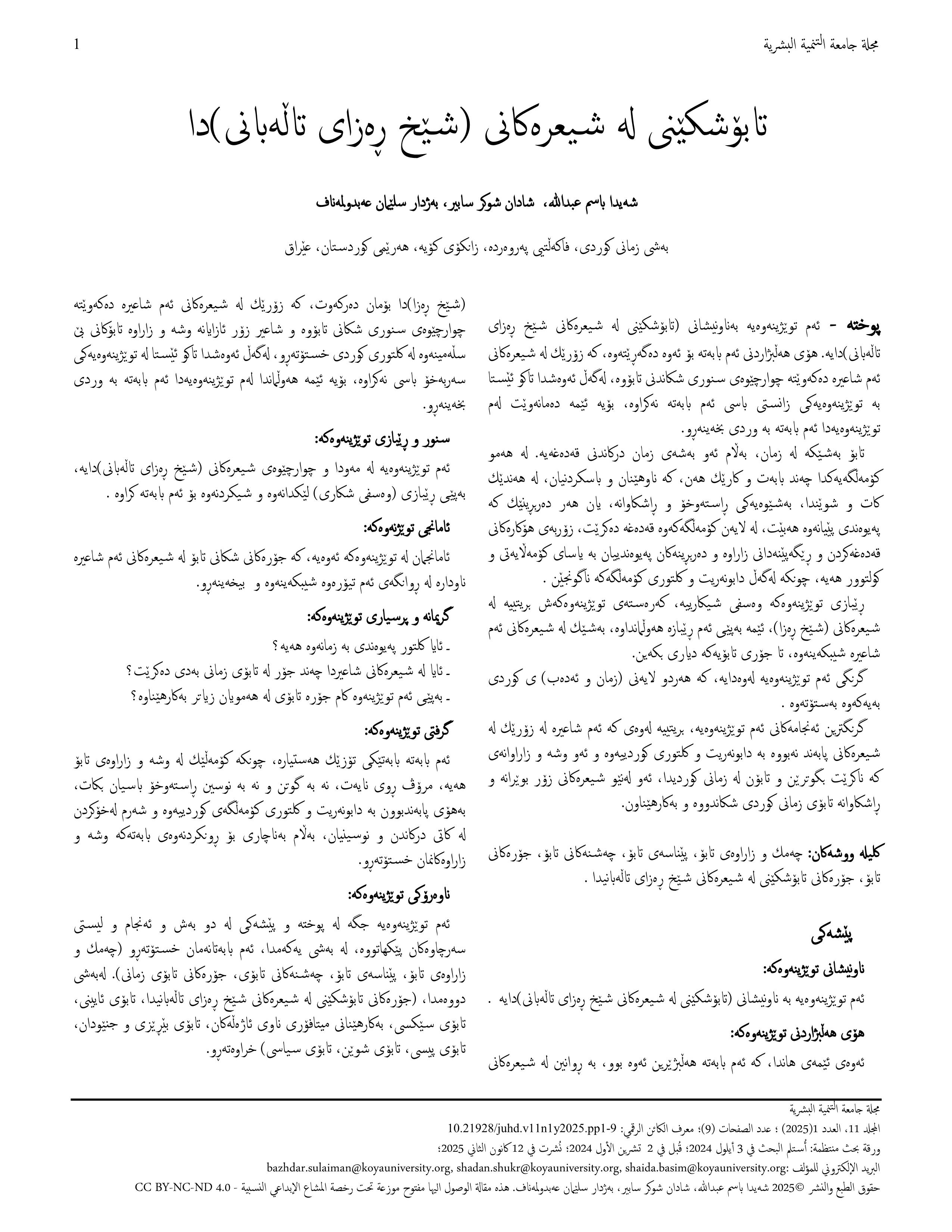Taboo breaking in the poems of Sheikh Reza Talabani
DOI:
https://doi.org/10.21928/juhd.v11n1y2025.pp1-9Keywords:
Concepts and terms of taboo, Definition of taboo, Types of taboo, types of taboo breaking in the poems of Sheikh Reza Talabani.Abstract
This research is entitled (Taboo Breaking in the Poems of Sheikh Reza Talabani). The reason for choosing this topic is that many of this poet's poems fall within the boundaries of breaking taboos, however, this topic has not been discussed in a scientific study, so we want to Let us present this issue in detail in this study.
Taboo is part of language, but that part of language is forbidden to be expressed. In every society, there are some things that are forbidden to be mentioned, at certain times and places, directly and explicitly, or any expression related to them Most of the reasons for banning terms and expressions are legal There are social and cultural because they do not fit with the traditions and culture of the society.
The research method is descriptive and analytical. The research material is the poems of Sheikh Reza. According to this method, we have tried to analyze some of the poems of this poet in order to determine the type of taboo.
The importance of this research is that it connects the two aspects of Kurdish language and literature.
The most important results of this research are that this poet did not adhere to Kurdish traditions and culture in many of his poems He has openly broken the taboos of the Kurdish language and used them.
References
به زمانی كوردی:
ئهحمهد، سیروان سهمین (2021) تابۆ له پهندی پێشیناندا، گۆڤاری زانكۆی كهركوك، بهرگی (16)، ژماره (2)، (447 ـ 459).
حەسەن، فەرهاد عەزیز (2016) داشۆرین لەنێوان شێخ رەزا و ئیرەج میرزا،
Bingolunive rsitesi Yasayan Diller Enstitusu Dergisi Yil:2, Volume2:
خاڵ، شێخ محەمەدی و ئاشنا، ئومێد (2003) دیوانی شێخ ڕەزای تاڵەبانی، دەزگای ئاراس، هەولێر.
فهرهج، شاخهوان جهلال (2011) تابۆ وهك نمونهیهكی پهیوهندی نێوان زمان و كلتور، نامهی دكتۆرا، زانكۆی سلێمانی.
فەلاح، شەریف (2014) شیعری شێخ ڕەزا تاڵەبانی لووتكەی هەڵچوونی
شەمس، هێمن عەبدولحەميد (2018) پەيوەندی و کارلێکی زمان و بير تابۆی سێکسی بەنمونە، گۆڤارى زانکۆ، بۆ زانستە مرۆڤايەتييەکان، ژمارە 3، کۆيە، 140.
عارف، زوبێر عهلی (٢٠١٢) ئيديهم له شێوهزاری ھهوراميدا، نامهی ماستهر، فاكهڵتيی زانسته مرۆڤايهتييهكان، زانكۆی سێمانی.
كهسنهزانی، بوشرا (2021) شیعری كلاسیكی كوردی و تابۆوشكێنی، چاپخانهی سهردهم، چاپی دووهم، سلێمانی.
موحسین، بههزاد (2008) كۆزمانهوانى، گۆڤاری ڕامان، ژماره (129)، ههولێر، 116.
به زمانی ئینگلیزی:
Armstrong, Nigel (2005) Translation, Linguistics, Culture A French–English Handbook), British Library Cataloguing in Publication Data.
Allan, Keith and Burridge, Kate (2006) Forbidden words. Taboo and the censoring of language. Cambridge: Cambridge University Press.
Allan, Keith (2016) Taboo, Monash University, Australia.
Abdul-Majeed, Rufaidah Kamal (2016) Taboo Words Vs. Social Deixis: A sociolinguistic Analysis of La Justice or The Cock that Crew: A Play from the Theatre of Ridiculous, University of Baghdad - College of Education for Women - English Language Dept. vol. 27 (1).
Fershtman, Chaim, Gneezy, Uri, and Hoffman, Moshe (2011) Taboos and Identity: Considering the Unthinkable, American Economic Journal: Microeconomics 3: 139–164.
Habibovic, Asima (2010) Taboo Language Swedish teenagers’ understanding of and attitudes to English taboo language, English Department, Kristianstad University.
Ningjue, Zhou (2010) Taboo Language on the Internet, An Analysis of Gender Differences in Using Taboo Language, Kristianstad University, English Department, Elective course: Language and gender.

Downloads
Published
How to Cite
Issue
Section
License
Copyright (c) 2025 Shaida Basim Abdulla, Shadan Shukr Sabir, Bazhdar Sleman Abdulmanaf

This work is licensed under a Creative Commons Attribution-NonCommercial-NoDerivatives 4.0 International License.


